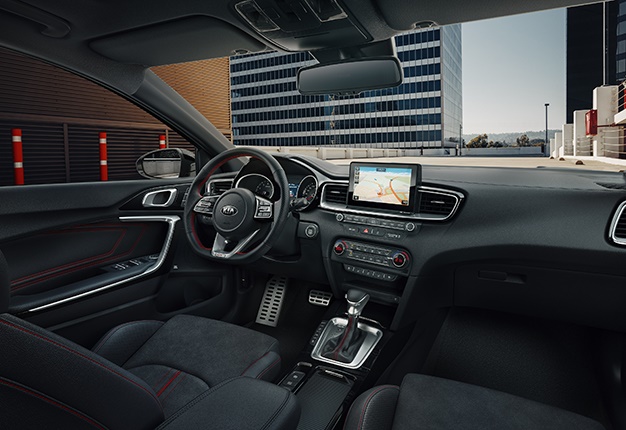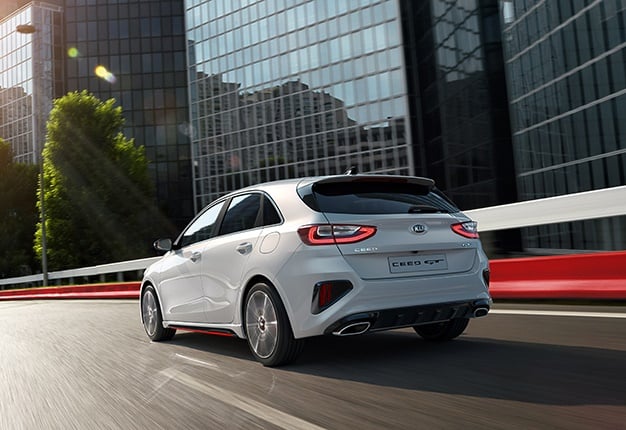
The new Kia Ceed GT has made its public debut at the 2018 Paris Motor Show, alongside the new ProCeed GT. The new model will be more accomplished and fun-to-drive than ever when sales start early in 2019.
The original cee’d GT and pro_cee’d GT was launched in 2013, representing the first ever performance hatchbacks from a Korean brand. It picks up where its predecessors left off, with an assured, engaging drive and a powerful 1.6-litre turbocharged engine, as well as a comprehensive range of comfort, safety and convenience technologies.
WATCH: Take a look at Kia's new Ceed
For the first time in a performance hatchback from KIA, the new Ceed GT will be available with an optional seven-speed double-clutch transmission, in addition to the standard six-speed manual gearbox.
The new Ceed GT and ProCeed GT will enter production in November at Kia’s Žilina production facility in Slovakia, alongside the Ceed, ProCeed and Ceed Sportswagon, introduced earlier in 2018.
Unique performance-inspired design
The Ceed GT features a sporty exterior design to differentiate it visually from other models in the Ceed range. Where the design of the new Ceed range is characterised by its blend of taut creases and curvaceous sheet metal, the GT variant presents a more athletic proposition than conventional versions of the car.
At the front, the Ceed GT has a new front bumper design, incorporating larger air intakes and gloss black trim along the base. Like the standard Ceed, the new GT features a modern interpretation of Kia’s four-lamp 'ice-cube’ LED daytime running lights, integrated into the main headlamp unit.
Kia’s tiger-nose grille is also adapted for the new model, with a dark chrome surround and a subtle 'GT' logo. The honeycomb grille pattern is also embedded with subtle red highlights.
In profile, it is finished with a glossy chrome window surround and features more substantial side sills, finished in gloss black and red. The standard 18" aluminium alloy wheels feature a new castellated centre cap finished in red, and house red brake calipers. At 135mm, the ride height is reduced by 5mm over other Ceed and Ceed Sportswagon variants, making it appear more planted on the road and reducing the overall centre of gravity.
Unique GT bumpers at the rear complement those found at the front, housing a subtle gloss black rear diffuser, as well as ‘GT’ badging. A small roof spoiler helps channel air cleanly off the top of the car. The Ceed GT will be available in a choice of eight paint finishes, with its own unique 18-inch alloy wheel design.
Sports-focused interior with everyday versatility
The Ceed GT features a series of changes to its cabin to separate it from non-GT models in the Ceed family line-up, with a sportier interior ambience.
The GT variant is built around the same ergonomic cabin architecture as other models in the Ceed line-up. Surfaces are finished in high-quality soft-touch materials and metallic trim, while the dashboard is angled towards the driver, making it easier to use on the move. At the centre of the dashboard is KIA’s ‘floating’ touchscreen infotainment system – 7.0- or 8.0-inches wide – with audio and heating and ventilation controls situated below.
A black roofliner, enveloping and cocooning occupants, replaces the grey cloth found in standard Ceed models. Every GT model features a D-shaped steering wheel bearing the ‘GT’ logo, as well as aluminium driver pedals. Models equipped with Kia’s double-clutch transmission feature new metal alloy shift paddles behind the steering wheel.
Front passengers in the Ceed GT are held in place by Kia’s new sports seats. Created exclusively for the new model, these seats provide larger, firmer side and thigh bolsters compared to the original cee’d GT. Seats are trimmed in black leather and suede and finished with red stitching and a red-stitched ‘GT’ logo in the seat back.
For many drivers, a performance hatchback has to be able to fit seamlessly into their daily lives – for many owners, it may be the only car they have access to. Practicality is therefore essential, and the new Ceed GT model is more practical than most, featuring the same large 395 litre boot as non-GT variants of the Ceed.
Image: Motorpress
Its low boot lip is 87mm lower compared to the previous-generation model, making it easier to load and unload heavy or bulky items. A split-level boot floor allows owners to lower or raise the height of the boot floor, to accommodate larger cargo or create a hidden compartment beneath. 60:40 split-fold rear seats are fitted as standard, which folds down with a single touch from a lever just inside the tailgate.
Accomplished, engaging and agile
Home of the performance hatch, Europe is characterised by its diverse driving conditions: high-speed motorways, zigzagging alpine routes, congested city centres and winding, unpredictable country lanes. The new KIA Ceed GT has been developed to master all these environments.
The Ceed GT has been engineered and developed exclusively for European roads and European drivers. At the direction of Albert Biermann, Head of KIA Vehicle Test and High-Performance Development, the car has undergone six months of additional testing, above and beyond the standard Ceed model line-up. The brief was to enhance cornering agility and yaw behaviour, increase traction and responsiveness, and retain the ‘gran turismo’ spirit of everyday usability that defines all Kia performance cars.
The GT model is fitted with the same fully-independent suspension hardware as the Ceed. However, the half-year of additional fine-tuning to the suspension geometry has rendered it more agile and more engaging to drive.
Image: Motorpress
The new performance hatchback sits 5mm lower than the standard Ceed and Ceed Sportswagon, reducing the centre of gravity. Stiffer front and rear springs reduce body roll, improve responses to steering inputs, and give the car a firmer, more assured ride in all conditions – crucially, without rendering the car uncomfortable on longer drives or over broken surfaces.
Furthermore, softer front and rear anti-roll bars ensure the inside tyre remains in contact with the road under heavy cornering, enhancing traction and grip. These changes to the suspension enable GT drivers to enjoy faster cornering speeds than they might in a number of more powerful front-wheel drive ‘hot hatches’.
In addition, the standard Electronic Stability Control (ESC) system has been carefully retuned to offer keener drivers more freedom to exploit the increased agility and enhance the yaw rate of the rear axle. Kia’s Vehicle Stability Management (VSM) system is also standard, as well as Torque Vectoring by Braking.
This additional electronic driver support feature intelligently brakes the inside wheels to reduce understeer around corners – making the Ceed GT more enjoyable and confidence-inspiring to drive on the type of winding lanes and mountain passes on which it has been developed.
Consistent stopping power is provided by larger brakes, with the standard Ceed’s 288mm ventilated front disc brakes replaced with 320mm discs. The GT’s brakes are also 3mm thicker, at 28mm, aiding kinetic heat absorption and braking performance with repeated use.
The new model offers greater potential for comfortable motorway cruising than many other more extreme hot hatches. KIA’s engineers have been careful to retain much of the comfort and unwavering high-speed stability that characterises the standard Ceed and other KIA vehicles, such as the Stinger when travelling at high speeds.
The Ceed GT is fitted as standard with Michelin Pilot Sport 4 tyres, enabling higher cornering velocity and traction. The car features electric motor-driven power steering, offering incisive responses to steering inputs with a fast 12.7:1 ratio and requiring only 2.44 turns lock-to-lock – 17% faster than the steering rack found in the original 2013 cee’d GT.
Powerful powerplant
When the first cee’d GT and pro_cee’d GT were revealed in 2013, they were powered by a newly-developed 1.6-litre T-GDi (turbocharged gasoline direct injection) engine. Downsized, turbocharged and quick to respond to driver inputs across the rev range, the new engine came to define the car’s effortless approach to power delivery in all conditions. The new Ceed GT retains this approach, with a 1.6-litre T-GDi engine that has been updated for the new model.
Producing 150kW at a 6 000r/min peak, the 1.6-litre T-GDi engine continues to provide effortless acceleration and easily-accessible torque. The engine’s maximum torque of 265Nm is available across a wide 1 500-to-4 500r/min rev range. The result is an engine which delivers as much of its performance as possible across all driving conditions.
The Ceed GT is paired with a six-speed manual transmission as standard. In response to customer demand across Europe, KIA’s seven-speed double-clutch transmission is also available for the first time in the brand’s performance hatch. Developed in-house, the double-clutch transmission further broadens the appeal of the Ceed GT, enabling quick-fire automatic gear shifts, or letting drivers take over with metal alloy steering wheel paddles.
Acceleration and emissions data will be released closer to the 2019 on-sale date, pending homologation later this year.
The Drive Mode Select system – available with the new seven-speed double-clutch transmission – enables owners to tailor their driving experience. Switching between Normal and Sport mode, Drive Mode Select alters the level of effort required to steer the car and subtly changes the character of the powertrain.
Normal mode maximises the potential for greater fuel efficiency and offers more relaxed steering inputs. Sport mode enhances throttle and transmission responses, enables maximum acceleration – from a standstill and at speed – and adapts the steering to offer additional weight and more decisive responses to inputs. It also lets owners make the most of the GT’s 6 000r/min peak power by holding on to gears longer under acceleration.
The engine is paired with an electronic sound generator which delivers a characterful GT engine note into the cabin. A sportier exhaust note has also been realised with the adoption of new exhaust flaps, which enhance the sense of acceleration when the driver pushes the accelerator pedal, and ensure the car remains hushed and refined at steady speeds.
Innovations to make life easier
The new Ceed GT provides owners and occupants with a wide range of technologies designed to make road travel as easy, comfortable and safe as possible.
The standard ‘floating’ infotainment system is available as either a 7" touchscreen audio system or 8,0-inch touchscreen navigation system, with navigation and KIA Connected Services powered by TomTom. The system enables full smartphone integration with Apple CarPlay (for iPhone 5 and onwards) and Android Auto (for Android phones running 5.0 (Lollipop) or higher).
Buyers can specify a powerful JBL Premium sound system with Clari-Fi music restoration technology. Standard technologies include full Bluetooth smartphone integration, automatic lights, and keyless entry.
An optional heated windshield uses nearly-imperceptible wires to gently heat the glass, making the car easier to live within colder months by melting away frost, ice and windscreen mist at the push of a button. A wireless smartphone charger and heated front and rear seats are also available.
Image: Motorpress
In addition to the car’s six standard airbags, advanced driver assistance technologies enhance occupant protection, using active safety systems to mitigate the risk of collisions. Standard safety technologies will include High Beam Assist, Driver Attention Warning, Lane Keeping Assist with Forward Collision-Avoidance Assist.
Lane Following Assist is also available, a ‘Level Two’ autonomous driving technology which tracks vehicles in front in traffic, and detects road markings to keep the car in its lane on the motorway. The system controls acceleration, braking and steering, using radar sensors to maintain a safe distance from the vehicle in front. Lane Following Assist operates between 0 and 180km/h.
Additional available technologies include Smart Cruise Control with Stop & Go, Blind Spot Collision Warning, Rear Cross-Traffic Collision Warning, Smart Parking Assist, and pedestrian recognition for the Forward Collision-Avoidance Assist system.
Every Ceed is equipped as standard with KIA’s Vehicle Stability Management (VSM). VSM ensures stability when braking and cornering by controlling the car’s Electronic Stability Control (ESC) if it detects a loss of traction.




 Publications
Publications
 Partners
Partners












